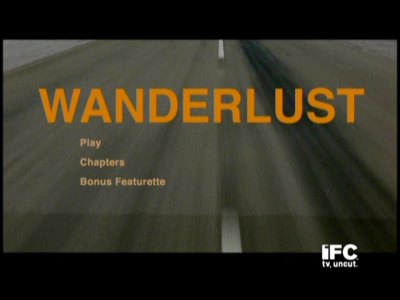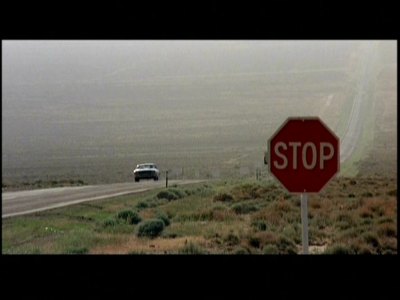| Reviews & Columns |
|
Reviews DVD TV on DVD Blu-ray 4K UHD International DVDs In Theaters Reviews by Studio Video Games Features Collector Series DVDs Easter Egg Database Interviews DVD Talk Radio Feature Articles Columns Anime Talk DVD Savant Horror DVDs The M.O.D. Squad Art House HD Talk Silent DVD
|
DVD Talk Forum |
|
|
| Resources |
|
DVD Price Search Customer Service #'s RCE Info Links |
|
Columns
|
|
|
Wanderlust
Wanderlust, an IFC/Netflix documentary chronicling the "road picture" genre in movies, works in fits and starts, particularly when it sticks to letting actual clips from celebrated road films speak for themselves. But gradually, the documentary becomes less and less interesting as the generalities and cliches pile up, bogging down in its own one-sided aesthetic and political viewpoints.

Wanderlust works best when it lets the films discussed, speak for themselves. Generous clips from movies as diverse as The Grapes of Wrath, Detour and Vanishing Point more than get across their own points about America's restless love affair with the road, with freedom, and with speed. Unfortunately, the directors of Wanderlust, Robert Pulcini and Shari Springer Berman, don't trust enough in the power that these images have to hold an audience, so they graft on an utterly superfluous fictional framing device of having "The Editor" (Paul Rudd) and "The Director" (Tom McCarthy) go out on the road to finish their/this documentary. Poorly written and indifferently (at best) acted, these scenes pop up throughout the documentary proper, aping scenes from other road pictures, while totally destroying the rhythm and context that the directors keep trying to build.
Quite a few familiar faces show up in Wanderlust to talk about the road picture, including Dennis Hopper, Wim Wenders, Gus Van Sant, Sam Shepard, Barry Levinson, Robert Benton, Karen Black, Monte Hellman, Arthur Hiller, Hal Needham, Lazlo Kovacs, Richard C. Sarafian, and many others. And while their comments are for the most part considered and helpful in widening the audience's appreciation of the genre (photographer Jeff Brouws comes off as the most thoughtful and fair in his assessment of the genre), generalities do tend to crop up (mostly at the hands of the two film historians that appear on camera). If you have any background in film or movie history, or for that matter, just a lot of experience watching films, you probably won't hear anything here that you didn't know already.
As well, Wanderlust's take on the various road pictures, both from an artistic and political standpoint, tends to be fixed along all-too-familiar lines. While no one is discounting the fact that a great many road pictures reflect or embody existential, introspective, nihilistic or ironic elements of society, that doesn't mean other examples of the road film that don't, are somehow less valid as artistic works. The film makes a point of singling out Hollywood "entertainment" road pictures, like Midnight Run, Planes, Trains, and Automobiles, and Smokey and the Bandit as examples of frivolous trifles that emphasis only pyrotechnics, spectacle and slapstick humor. It's an age-old, elitist snobbery that goes back to Chaplin versus Laurel and Hardy: that somehow, depressing drama is intrinsically more "valuable" artistically, than comedy.
As well, the modern obsession in film studies with angst, and the subsequent imperious dismissal of comedy or anything that may be considered "light" or ultimately hopeful or positive, comes from a certain quarter of the film industry and film historians, and frankly, it's a boring cliche. I, for one, would take Midnight Run any day over some of the pretentious claptrap that's championed in Wanderlust. I'm not sure if Hal Needham realized it at the time, but his inclusion in this film, and the choices that were made as to which of his sound bites to use, would indicate to me that he was included as proof that Smokey and the Bandit was a soulless, money-making machine, and not a ragged, rough, woolly cartoon brought to road picture life (with one of the all-time great comedic performances by Jackie Gleason). Other road pictures that involve comedy or romance that ends hopefully (as opposed to something like Gun Crazy or Bonnie and Clyde), aren't even included, such as the beautiful, mesmerizing Two for the Road, or the biggest road picture of all: It's a Mad, Mad, Mad, Mad World -- a comedy. Politics play a part in these distinctions, as well; the film makes a point of criticizing the "inherent immorality of Reaganomics," in relation to the yuppie-based road pictures (such as Something Wild), but nowhere did I hear the names "John Kennedy" or "Lyndon Johnson" in connection with Vietnam, and its impact on the turbulence of the 1960s, and by extension, the road picture genre (indeed, Wanderlust only shows Nixon and Reagan's faces in its newsreel clips - never LBJ or Carter or Clinton). A discussion of politics is necessary when trying to understand this genre, but staying to one side of the political fence only marginalizes the film's conclusions.

The DVD:
The Video:
The widescreen, 1.78:1, non-anamorphic transfer for Wanderlust is immaculate. All of the film clips look startlingly clear.
The Audio:
The Dolby Digital English 2.0 stereo mix is quite strong; there is no close-captioning.
The Extras:
There's an 11-minute featurette called Journeys that features extended interviews with some of the commentators in Wanderlust. It's fairly interesting, depending on the commentator.
Final Thoughts:
If you love road pictures, you're not going to hear anything in Wanderlust that you didn't know already. And while the generalities can get sticky, as well as the film's determination to lean only one way in its appreciation of the genre, Wanderlust is still worth a rental for the spectacular clips, and if you want some ideas for your next road picture marathon.
Paul Mavis is an internationally published film and television historian, a member of the Online Film Critics Society, and the author of The Espionage Filmography.


|
| Popular Reviews |
| Sponsored Links |
|
|
| Sponsored Links |
|
|
| Release List | Reviews | Shop | Newsletter | Forum | DVD Giveaways | Blu-Ray | Advertise |
|
Copyright 2024 DVDTalk.com All Rights Reserved. Legal Info, Privacy Policy, Terms of Use,
Manage Preferences,
Your Privacy Choices | |||||||













